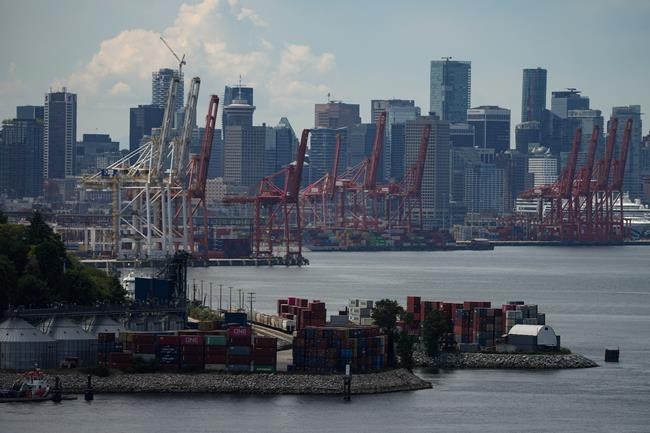VANCOUVER — Workers are back on strike at British Columbia ports after their union rejected a mediator's tentative agreement, stunning business community leaders who had welcomed the end of strike action last week.
The International Longshore and Warehouse Union Canada announced Tuesday its leadership caucus chose to reject the tentative agreement because it did not believe the deal can protect jobs "now or into the future."
The BC Maritime Employers Association said the union rejected the deal without sending it to a full membership vote.
The employers organization also said the rejected deal was "fair and comprehensive," with hikes in wages and benefits above the 10 per cent increases workers had received over the past three years.
However, union president Rob Ashton said the four-year agreement was "far too long" given the uncertainties in the industry and the economy overall.
A late-night joint statement was released by the Minister of Labour, Seamus O'Regan, and Transport Minister Omar Alghabra, confirming the employers' association agreed to the terms of the deal, but the workers' union leadership decided not to recommend ratification of the terms to its members.
The pair also expressed disappointment, saying that the mediated deal ending the work stoppage was the result of a constructive and substantive collective bargaining process.
The ministers' joint statement also seems to hint at a possible move to introduce back-to-work legislation, stating, "We have been patient. We have respected the collective bargaining process. But we need our ports operating."
Dozens of strikers were back on picket lines in East Vancouver near the union's headquarters late Tuesday afternoon, some wearing "ILWU on strike" sandwich boards. They declined to comment, saying they had been instructed not to speak to media.
B.C. Chamber of Commerce President Fiona Famulak said she was "profoundly disappointed" with the resumption of the strike and called a longer-term port shutdown "absolutely untenable."
Greater Vancouver Board of Trade President and CEO Bridgitte Anderson said the group is restarting its Port Shutdown Calculator, which estimated that almost $10 billion in traded goods were affected during the initial strike action from July 1 to July 13.
The 13-day strike that ended last Thursday involved about 7,400 port workers at more than 30 port terminals and other sites across the province.
The strike froze billions of dollars worth of cargo from moving in and out of harbours, including at Canada's busiest port in Vancouver.
Premiers in Western Canada said last week at a conference in Winnipeg that a prolonged disruption at B.C. ports would not only harm Canadians in the short-term through disrupting supply chains, but damage Canada's reputation as a global business partner over the longer term.
In response to the strike's resumption, Alberta Premier Danielle Smith tweeted that "the federal government must reconvene Parliament and legislate these workers return to work."
Meanwhile, federal NDP transport critic Taylor Bachrach said in a statement that while the strike resumption was a setback, it is within a union's bargaining rights to reject an agreement, and negotiations should continue without the threat of a legislated end to the dispute.
"We are also renewing our call for the federal government to support the collective bargaining process, rather than resorting to the sort of back-to-work legislation that Liberal and Conservative governments have imposed far too often,” Bachrach said.
Ashton said the union's resolve remains unchanged.
"Our position since Day 1 has been to protect our jurisdiction and this position has not changed," his statement said.
"With the record profits that the BCMEA’s member companies have earned over the last few years, the employers have not addressed the cost of living issues that our workers have faced over the last couple of years as all workers have."
The employers association said the package "could not satisfy some of ILWU internal caucus leadership."
"In rejecting this tentative agreement, ILWU leadership is choosing to further harm Canada’s economy, international reputation and most importantly, to Canadians, their livelihoods and all those that rely on a stable supply chain," it said.
Famulak said the federal government needs to “use every single tool in their tool box” to end the conflict.
“And if that means that it needs to be legislated back to work, then that's what it means.”
— With files from Brieanna Charlebois
This story by The Canadian Press was first published July 18, 2023.
Chuck Chiang, The Canadian Press




